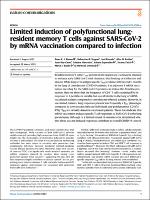Limited induction of polyfunctional lung-resident memory T cells against SARS-CoV-2 by mRNA vaccination compared to infection
Author
Date
2023-04-05Permanent link
https://hdl.handle.net/11351/9420DOI
10.1038/s41467-023-37559-w
ISSN
2041-1723
PMID
37019909
Abstract
Resident memory T cells (TRM) present at the respiratory tract may be essential to enhance early SARS-CoV-2 viral clearance, thus limiting viral infection and disease. While long-term antigen-specific TRM are detectable beyond 11 months in the lung of convalescent COVID-19 patients, it is unknown if mRNA vaccination encoding for the SARS-CoV-2 S-protein can induce this frontline protection. Here we show that the frequency of CD4+ T cells secreting IFNγ in response to S-peptides is variable but overall similar in the lung of mRNA-vaccinated patients compared to convalescent-infected patients. However, in vaccinated patients, lung responses present less frequently a TRM phenotype compared to convalescent infected individuals and polyfunctional CD107a+ IFNγ+ TRM are virtually absent in vaccinated patients. These data indicate that mRNA vaccination induces specific T cell responses to SARS-CoV-2 in the lung parenchyma, although to a limited extend. It remains to be determined whether these vaccine-induced responses contribute to overall COVID-19 control.
Keywords
SARS-CoV-2; T cells; VaccinesBibliographic citation
Pieren DKJ, Kuguel SG, Rosado J, Robles AG, Rey-Cano J, Mancebo C, et al. Limited induction of polyfunctional lung-resident memory T cells against SARS-CoV-2 by mRNA vaccination compared to infection. Nat Commun. 2023 Apr 5;14:1887.
Audience
Professionals
This item appears in following collections
- Col·lecció especial COVID-19 [945]
- HVH - Articles científics [4476]
- VHIR - Articles científics [1751]
The following license files are associated with this item:

 Private area
Private area Contact Us
Contact Us








